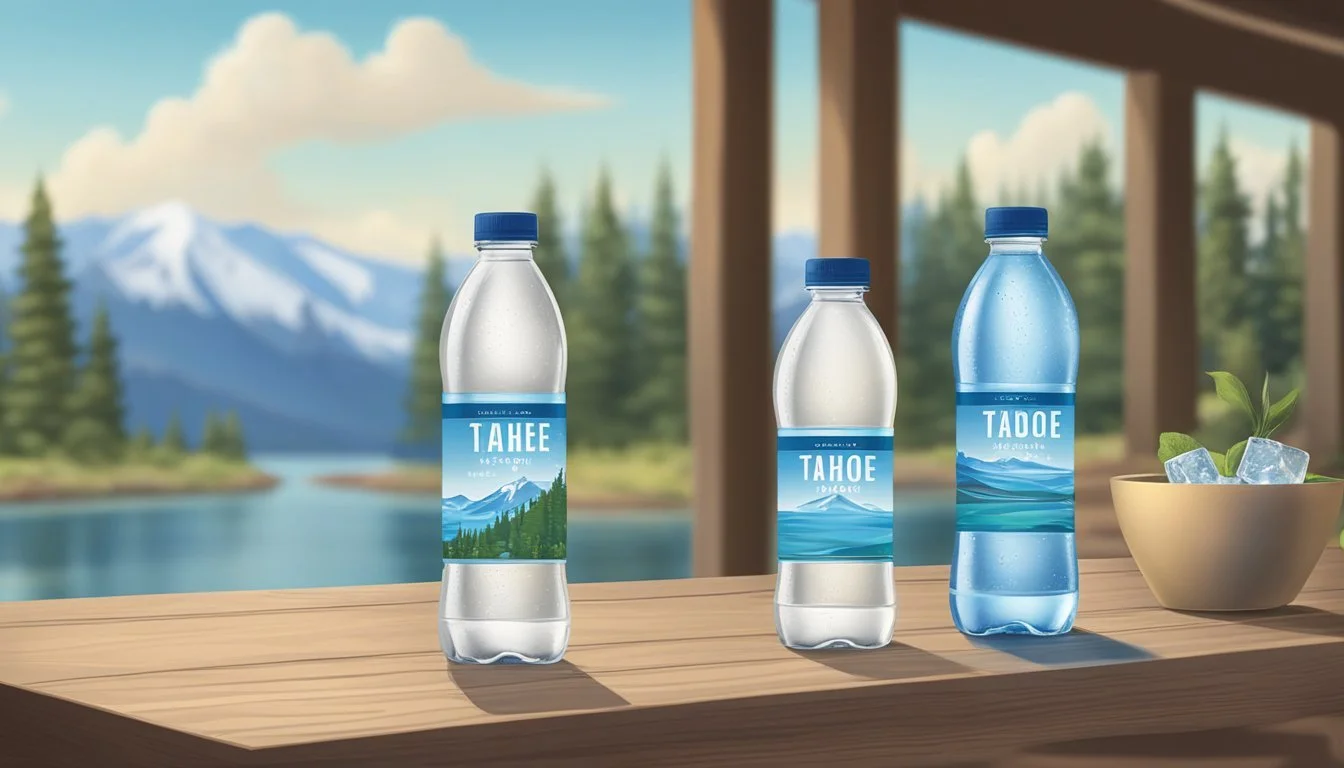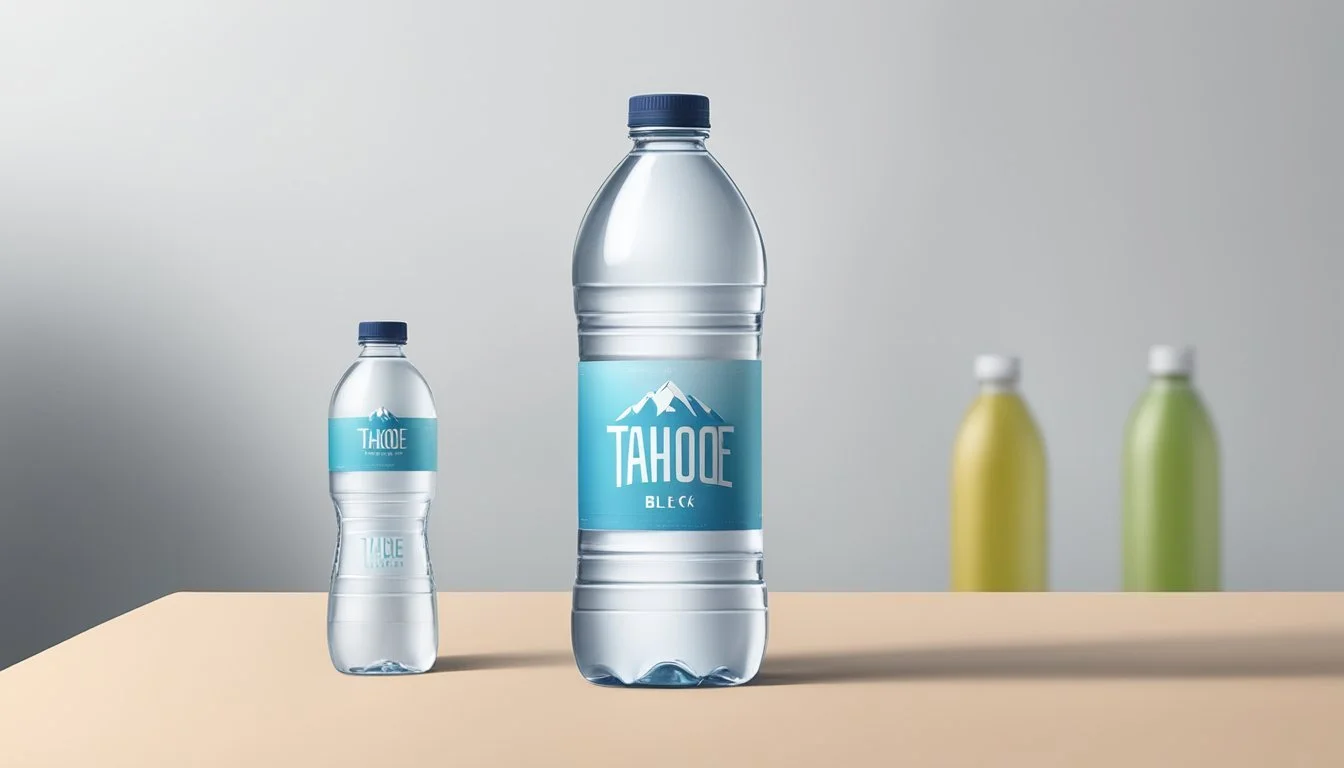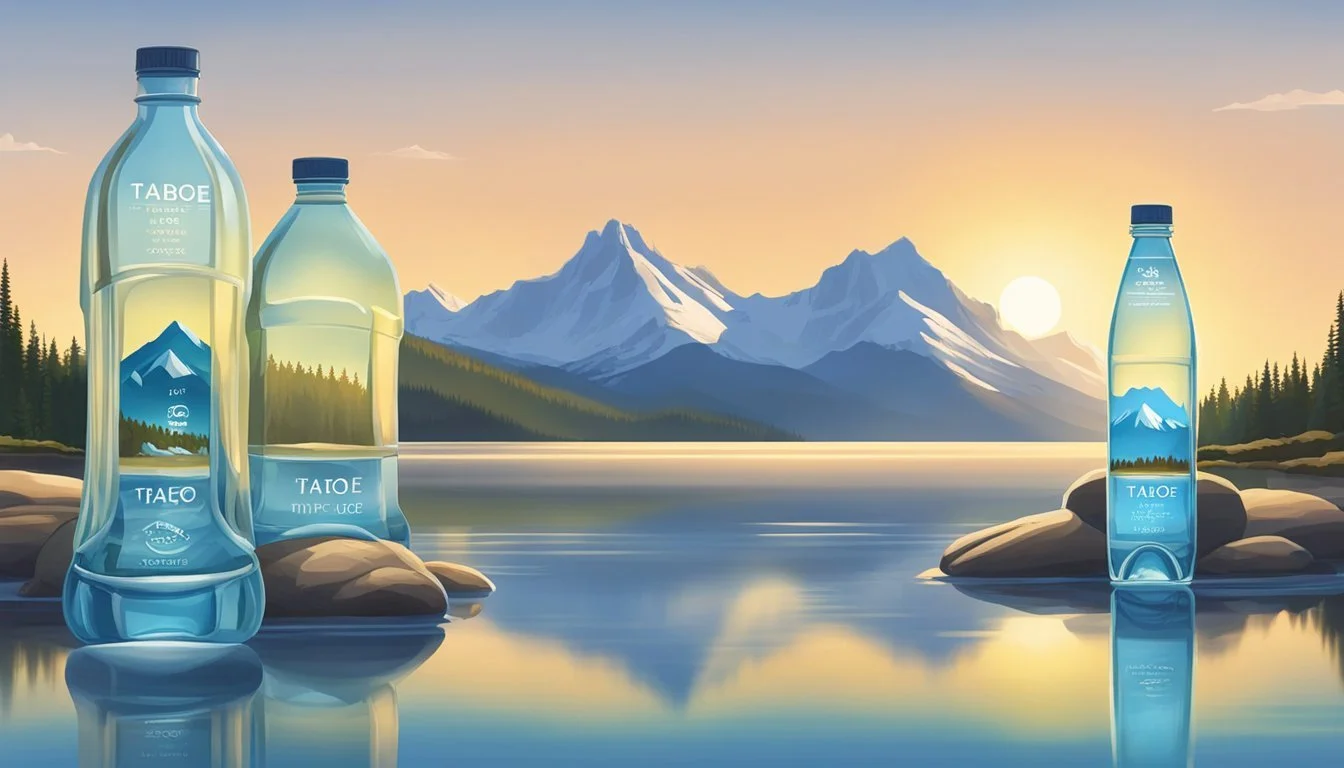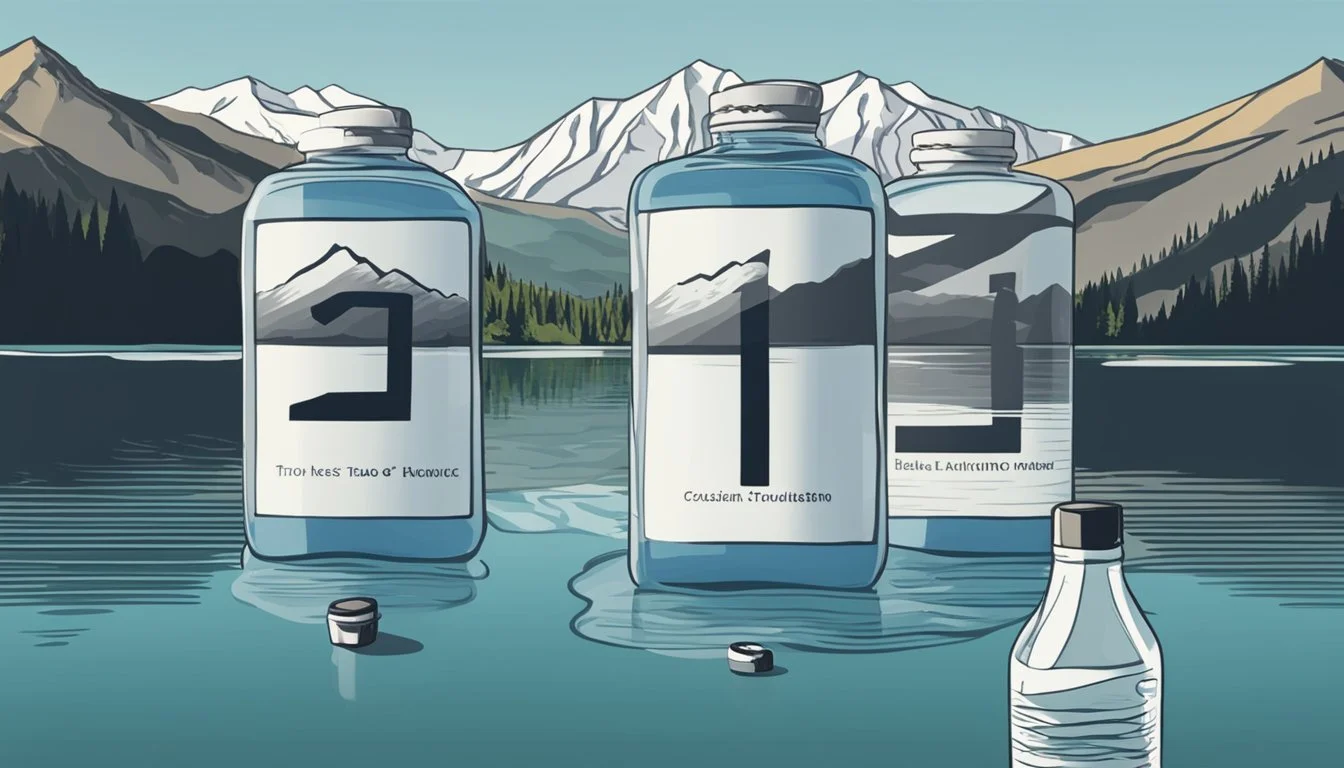Tahoe vs. Blk
Which Bottled Water Offers Superior Quality?
When exploring the bottled water market, two brands stand out for their unique qualities: Tahoe and Blk. Both offer distinct features that cater to different preferences and needs. Tahoe is renowned for its crisp, refreshing taste, originating from pristine natural springs, making it a go-to for those who prioritize purity and natural hydration.
Blk water distinguishes itself with a striking black color, infused with fulvic acid, which is believed to offer additional health benefits. This unique characteristic attracts those looking for something beyond ordinary hydration. From a taste perspective, Tahoe generally surpasses Blk due to its clean and refreshing profile, while Blk's earthy undertones may appeal to those seeking a different experience.
Ultimately, the choice between Tahoe and Blk hinges on one's personal preferences and desired benefits. For those who prioritize taste and natural spring sources, Tahoe is the preferred option. Conversely, Blk offers a novel approach to hydration with potential health benefits, appealing to the more adventurous consumer.
Overview of Bottled Water
Bottled water has become a staple in many households and a key component of daily hydration routines. This market has seen significant growth, driven by increased awareness of health and wellness.
Different bottled water brands cater to varying consumer preferences. Brands like Tahoe and Blk provide unique offerings, each with its own set of features and benefits designed to attract specific demographics.
Market Trends
The bottled water industry is influenced by several trends.
Sustainability: Consumers are leaning towards eco-friendly packaging.
Health Consciousness: There's a rising demand for water types like alkaline and mineral-enriched varieties.
Convenience: Busy lifestyles drive the need for portable hydration options.
Consumer Preferences
Consumer preferences are diverse and often hinge on factors such as taste, price, and health benefits.
Some prefer brands that offer enhanced water with added minerals.
Others look for cost-effective options without compromising on quality.
Popular Brands
A comparison of brands reveals interesting insights:
Arrowhead: Known for its natural spring water.
Tahoe: Offers a refreshing taste and is favored for its clean, crisp quality.
Blk: Stands out due to its distinct dark color and mineral content.
Bottled water remains a popular choice for many due to its convenience and the assurance of quality and safety. The market continues to evolve, with brands innovating to meet the changing demands of consumers.
Understanding Water Quality and Purity
Water quality and purity are crucial in determining the safety and health benefits of bottled water. Key areas such as the importance of purity, assessment of contaminants, and adherence to standards and regulations are vital to this understanding.
Importance of Purity in Bottled Water
Purity in bottled water is fundamental for consumer health. Pure water lacks harmful contaminants like bacteria, viruses, and chemicals. Bottled water companies often highlight the mineral content and natural sourcing of their products to showcase purity.
Brands like Tahoe and Blk emphasize their unique purification processes. Tahoe, known for its natural spring source, ensures minimal contamination. Blk, with its distinctive fulvic trace minerals, claims added health benefits due to its mineral-rich composition.
Assessment of Contaminants and Impurities
Assessing contaminants is a multi-faceted process. It involves testing for microorganisms, heavy metals, and other chemicals. Tahoe water, sourced from pristine springs, undergoes rigorous testing to ensure its purity.
For Blk, the focus is on the unique composition of fulvic trace minerals. Despite its black color, stringent tests ensure it remains free from harmful substances.
Water is analyzed using methods like chromatography and other chemical tests to detect traces of lead, arsenic, and other potentially dangerous elements.
Standards and Regulations
Bottled water quality is regulated by health authorities like the EPA and FDA. These agencies set stringent standards for contaminant levels. Compliance ensures the water is safe for consumption.
Tahoe adheres to these standards by maintaining high levels of purity through continuous monitoring. The addition of fulvic acid in Blk meets regulatory requirements, confirmed through periodic inspections and certifications.
Quality control measures include regular factory inspections, third-party audits, and adherence to bottling regulations. Meeting these standards provides consumers with confidence in the safety and quality of their bottled water choices.
Comparing Tahoe and Blk
Tahoe and Blk bottled waters differ significantly in their origins, branding, packaging, consumer appeal, price points, and market positioning. Understanding these differences will help consumers make an informed choice.
Historical Origins and Branding
Tahoe, sourced from pristine mountain springs, emphasizes purity and natural sources in its branding. It markets itself as a premium, eco-friendly option.
Blk, on the other hand, gains attention with its unique selling point: fulvic trace minerals, which give the water its distinctive black color. This branding sets Blk apart as a health-centric, novelty product in the hydration market.
Both brands thus leverage their origin stories to appeal to different consumer preferences.
Package Design and Consumer Appeal
Tahoe’s packaging reflects its premium market positioning. It uses sleek, minimalist design with transparent bottles that convey clarity and purity. The brand often includes eco-friendly materials in its packaging, reinforcing its environmental commitment.
Blk’s packaging is bold and modern, featuring black bottles with striking white labels. This design aligns with its novelty appeal and targets consumers looking for a unique and health-focused product.
While Tahoe leans towards tradition and simplicity, Blk opts for innovation and eye-catching aesthetics.
Price Point and Market Positioning
Tahoe positions itself in the higher price segment, reflecting its premium quality and source. It targets consumers willing to pay more for natural, sustainable bottled water.
Blk also occupies a premium market space but differentiates itself with its functional benefits. The inclusion of minerals and its distinctive color justify its higher price point. This positions Blk as not just a hydration source but also a wellness product.
Both waters, while premium, attract different consumer segments based on their unique selling points and market strategies.
Source and Purification Process
The origins and purification processes of water are crucial when comparing bottled water brands. Tahoe and Blk each have distinct methods of sourcing and filtering their products, affecting their quality and taste.
Types of Water Sources
Both Tahoe and Blk bottle water sourced differently.
Tahoe typically sources its water from natural springs and groundwater. This type of water is often rich in minerals and has a crisp, natural taste. Such sources are valued for their purity and mineral content.
Blk, on the other hand, sources its unique black water from spring water or purified water. The key difference lies in the infusion of fulvic trace minerals, turning the water black and adding potential health benefits.
Modern Purification Techniques
Purification techniques ensure the water is safe and pleasant to drink. Spring water undergoes minimal filtration, primarily to remove physical impurities.
Purified water like that used by Blk often undergoes reverse osmosis, ultraviolet exposure, and distillation. These processes remove contaminants, ensuring 99.9% purity.
Blk infuses its water with fulvic minerals post-purification, adding unique properties and benefits. This combination of purification techniques ensures the safety and cleanliness of the water while also providing added minerals.
Spring Water versus Purified Water Comparison
Spring water is prized for its natural origins and minimal processing. It maintains a natural mineral content, which can enhance flavor and offer health benefits.
Purified water, however, often has a cleaner, more neutral taste due to rigorous filtration methods like reverse osmosis and distillation.
While spring water can sometimes carry natural contaminants, purified water from brands like Blk guarantees extensive purification. This leads to a consistent, clean product, free from impurities.
Tahoe and Blk offer different experiences—one rooted in natural simplicity, the other in modern purity.
Analyzing Mineral Content and Health Benefits
Mineral content and electrolyte balance are critical factors in choosing between Tahoe and Blk bottled water. These aspects directly impact hydration effectiveness and overall health.
Essential Minerals for Hydration
Tahoe and Blk waters both contain essential minerals that support hydration but differ in composition. Tahoe water typically includes calcium, magnesium, and potassium, which are vital for maintaining a balanced mineral intake. Calcium aids in bone health and nerve function, while magnesium supports muscle function and helps prevent cramps.
Blk water is unique due to its inclusion of fulvic minerals, which are believed to assist in nutrient absorption and detoxification. These minerals can enhance overall mineral uptake, potentially leading to better hydration and improved digestive health. The presence of fulvic acid in Blk water sets it apart from many other bottled water brands.
The Role of Electrolytes in Hydration
Electrolytes are compounds that conduct electricity when dissolved in water, and they are crucial for maintaining fluid balance in the body. Tahoe water often contains a balanced mix of sodium, potassium, and magnesium. These electrolytes are essential for preventing dehydration, regulating blood pressure, and supporting muscle function.
Blk water also contains electrolytes, enhanced by its fulvic mineral content, which may increase electrolyte absorption and efficiency. This feature can be particularly beneficial for athletes or individuals engaging in rigorous activities. Proper electrolyte balance helps maintain energy levels and supports overall hydration.
In summary, both Tahoe and Blk waters offer unique advantages related to their mineral and electrolyte profiles. Their distinct compositions cater to different hydration needs and health preferences, making each suitable for specific consumer requirements.
Taste Profile and Water Sommelier Insights
Both Tahoe and Blk offer distinct taste profiles, influenced by their unique mineral compositions. Water sommeliers provide critical insights into how these differences impact the tasting experience.
Describing the Flavor Notes
Tahoe: Known for its crisp, clean taste, Tahoe water is typically low in mineral content, which contributes to its refreshing and neutral flavor. Key notes: Subtle sweetness with a slightly alkaline finish.
Blk: Blk water is distinguished by its black color due to fulvic acid. This addition doesn't just alter the appearance; it also adds a mild earthy flavor. Key notes: Earthy undertones with a slightly higher mineral taste.
Expert Opinions on Water Taste
According to water sommeliers, Tahoe's minimal mineral presence makes it a versatile choice, preferred for its pure and clean taste that complements various foods without overpowering them.
Blk offers a unique tasting experience with its higher mineral content and fulvic acid. Sommeliers highlight its ability to offer a slightly different texture and mouthfeel, often described as more substantial and rich compared to other bottled waters.
Water experts also emphasize the refreshing quality of both brands, with Tahoe being praised for its lightness and Blk for its distinctive mineral-rich taste.
Environmental Considerations
The environmental impact of bottled water hinges on the bottling process, packaging materials, and the sustainability measures the brands take. Tahoe and Blk have different approaches that could significantly affect your choice based on environmental concerns.
Bottling Process and Carbon Footprint
The carbon footprint of bottled water starts with the bottling process. Tahoe utilizes spring water sourced locally, which helps reduce emissions related to transportation.
Blk water, on the other hand, undergoes additional processes to infuse the water with fulvic minerals, potentially increasing its carbon emissions. Energy consumption and greenhouse gas emissions are key factors here.
Comparing the two, Tahoe appears to have a simpler, more localized process, possibly resulting in a lower carbon footprint.
Eco-friendliness of Packaging Materials
Packaging plays a critical role in assessing environmental friendliness. Tahoe offers its water in plastic bottles, a common choice but one facing criticism for its environmental impact. Although these plastics are usually recyclable, the recycling rates remain relatively low, leading to pollution.
Blk water often markets its bottles as BPA-free, but they are still primarily made of plastic. Alternatives like glass bottles, which are more sustainable, are not commonly used by either brand.
The difference in eco-friendliness between Tahoe and Blk can be subtle but consequential in terms of plastic waste.
Sustainability Efforts by Brands
Both brands have made strides in sustainability, yet their efforts differ. Tahoe promotes its local sourcing as a measure to cut down on transportation emissions.
Blk emphasizes the health benefits and multifunctionality of its product, but its sustainability initiatives are less pronounced. Initiatives like reducing the plastic footprint and investing in recycling programs can enhance a brand’s environmental credentials.
Examining these efforts reveals Tahoe’s more straightforward approach focusing on source sustainability, while Blk could gain from more visible and aggressive sustainability campaigns.
Consumer Preferences and Trends
Consumer choices in bottled water are driven by a mix of health benefits, environmental considerations, and convenience factors.
Demand for Alkaline and Specialty Waters
Health-conscious consumers are increasingly seeking alkaline water due to its purported health benefits.
Blk water, with a pH ranging from 8 to 9.5 due to its fulvic acid content, appeals to those who believe alkaline water can help balance body pH levels.
The unique mineral compositions, including trace minerals, draw in consumers looking for additional health boosts from their water. Specialty waters like these often command higher prices due to their perceived added value.
This trend underscores a growing preference for products that go beyond basic hydration.
Shift Toward Eco-conscious Consumption
Environmental awareness is shaping consumer behavior, pushing many towards eco-friendly choices.
Shoppers are scrutinizing the environmental impact of their bottled water choices. Recycled and biodegradable packaging options are gaining traction, with brands responding to this demand by innovating sustainable packaging solutions.
Consumers are also checking for certifications that guarantee environmentally responsible practices.
Some brands are investing in carbon-neutral production processes, appealing to the eco-conscious segment keen on reducing their carbon footprint.
Popularity of Reusable Bottles
The desire for sustainability has led to a rise in the popularity of reusable water bottles.
Consumers are not only switching to bottled water packaged in eco-friendly materials but also investing in durable, reusable bottles.
Brands promoting stylish and functional reusable bottles cater to this trend, making them a popular accessory for daily use.
This shift reflects a broader move towards minimizing single-use plastics, with consumers prioritizing long-term usage over one-time convenience. As a result, more people are choosing water brands that align with these sustainable practices.
Conclusion
When examining Tahoe and Blk bottled waters, distinct differences emerge in taste, composition, and potential health benefits.
Taste:
Tahoe: Known for its crisp and clean flavor, a preference for those who enjoy a refreshing taste.
Blk: Unique due to its alkaline properties and distinct, slightly earthy flavor.
Composition:
Tahoe: Balanced mineral content and neutral pH.
Blk: Infused with fulvic minerals, offering potential health benefits and a naturally high pH level.
Health Benefits:
Some studies suggest alkaline waters like Blk may improve gut health and sleep quality.
Tahoe's balanced minerals support overall hydration needs without extra additives.
Consumer Recommendations:
Opt for Tahoe if taste and a straightforward hydration option are priorities.
Choose Blk if interested in potential health benefits from its unique mineral content.
Consumers should weigh these factors according to their preferences. Both brands offer distinct advantages, making them suitable for different hydration needs and tastes.
More About Tahoe
Mountain Valley Spring Water vs Tahoe: Which Bottled Water is Better?
Tahoe vs Richard's Rainwater: Which Bottled Water is Better?
Tahoe vs Whole Foods Italian Still Mineral water: Which Bottled Water is Better?







